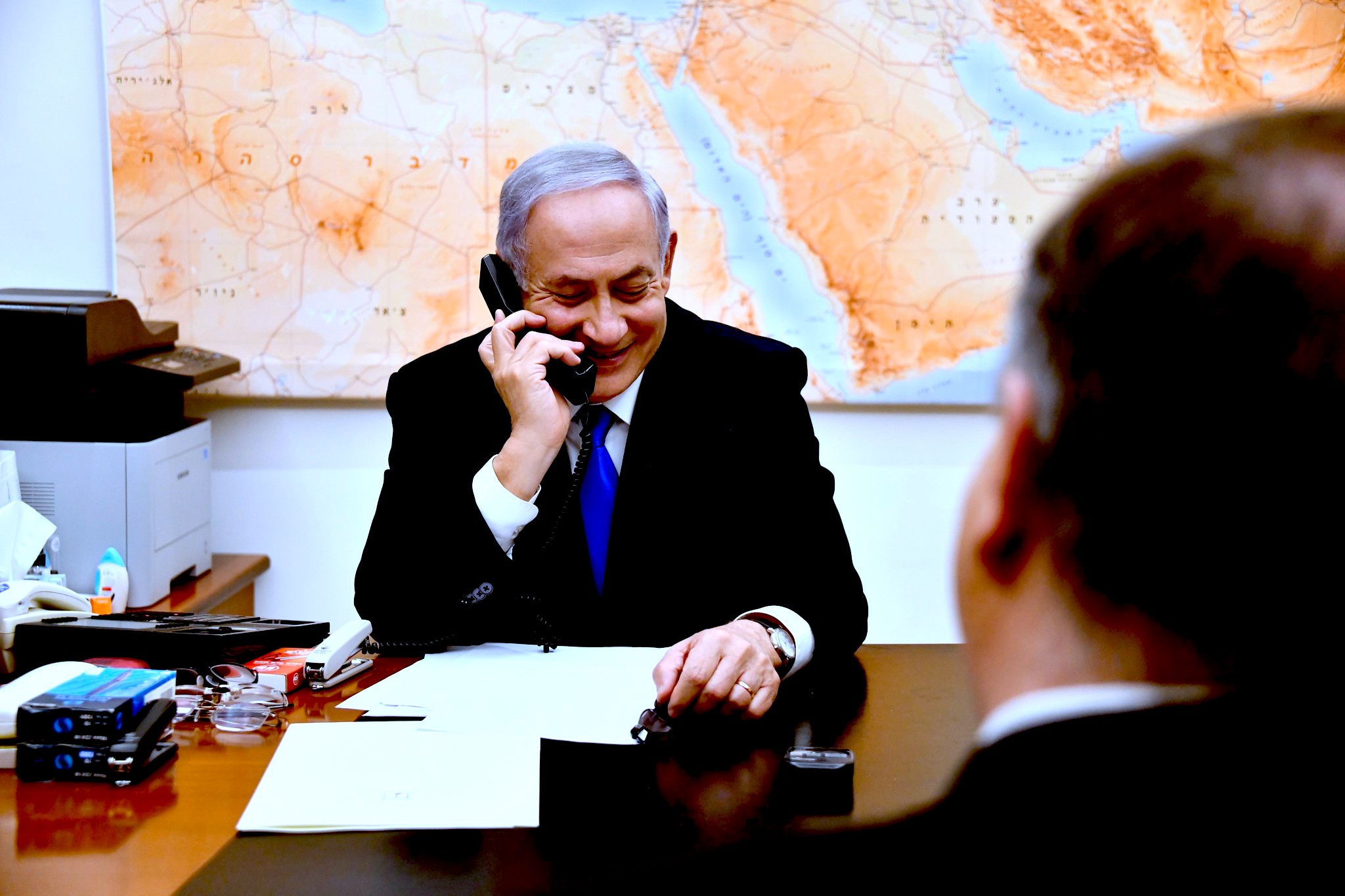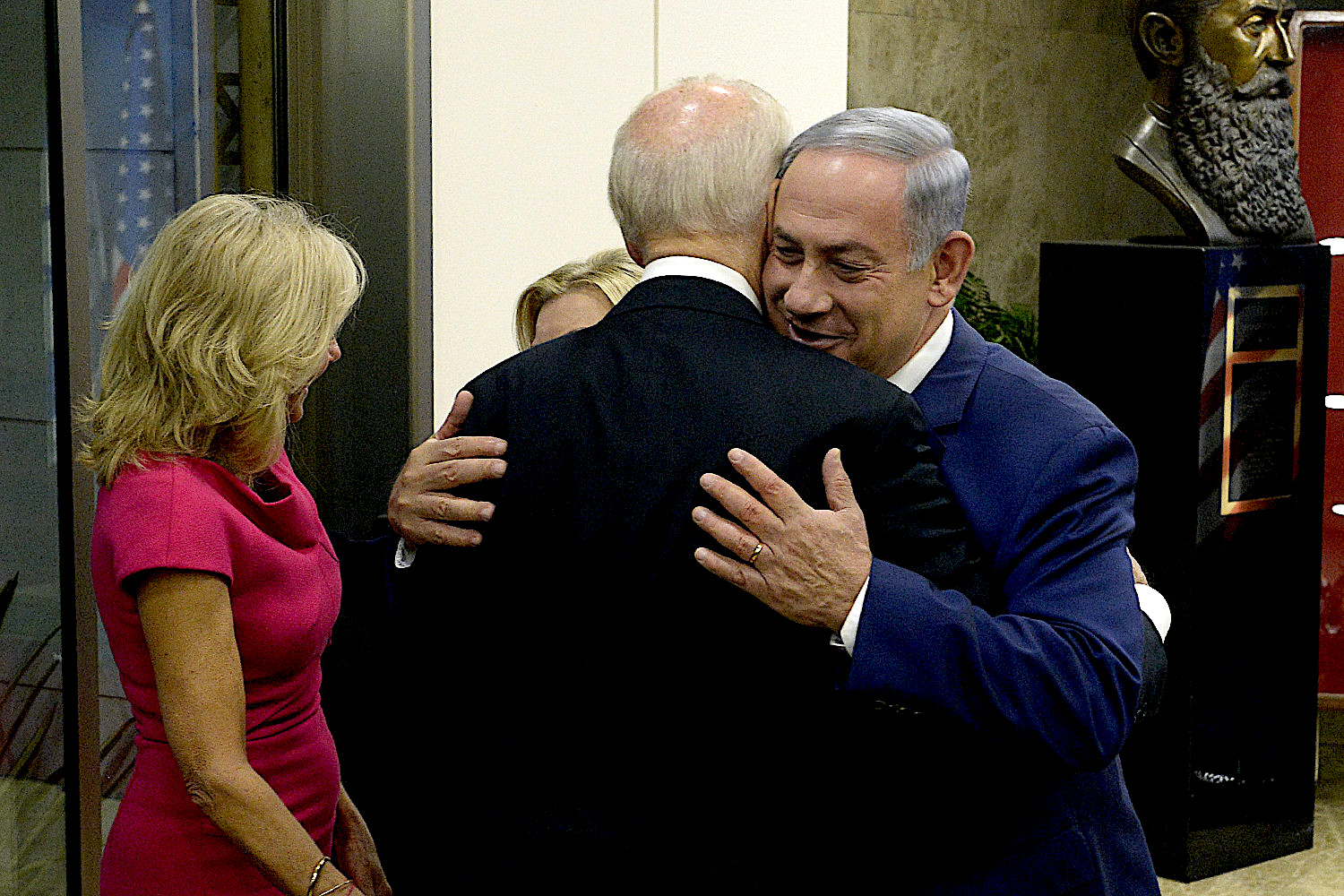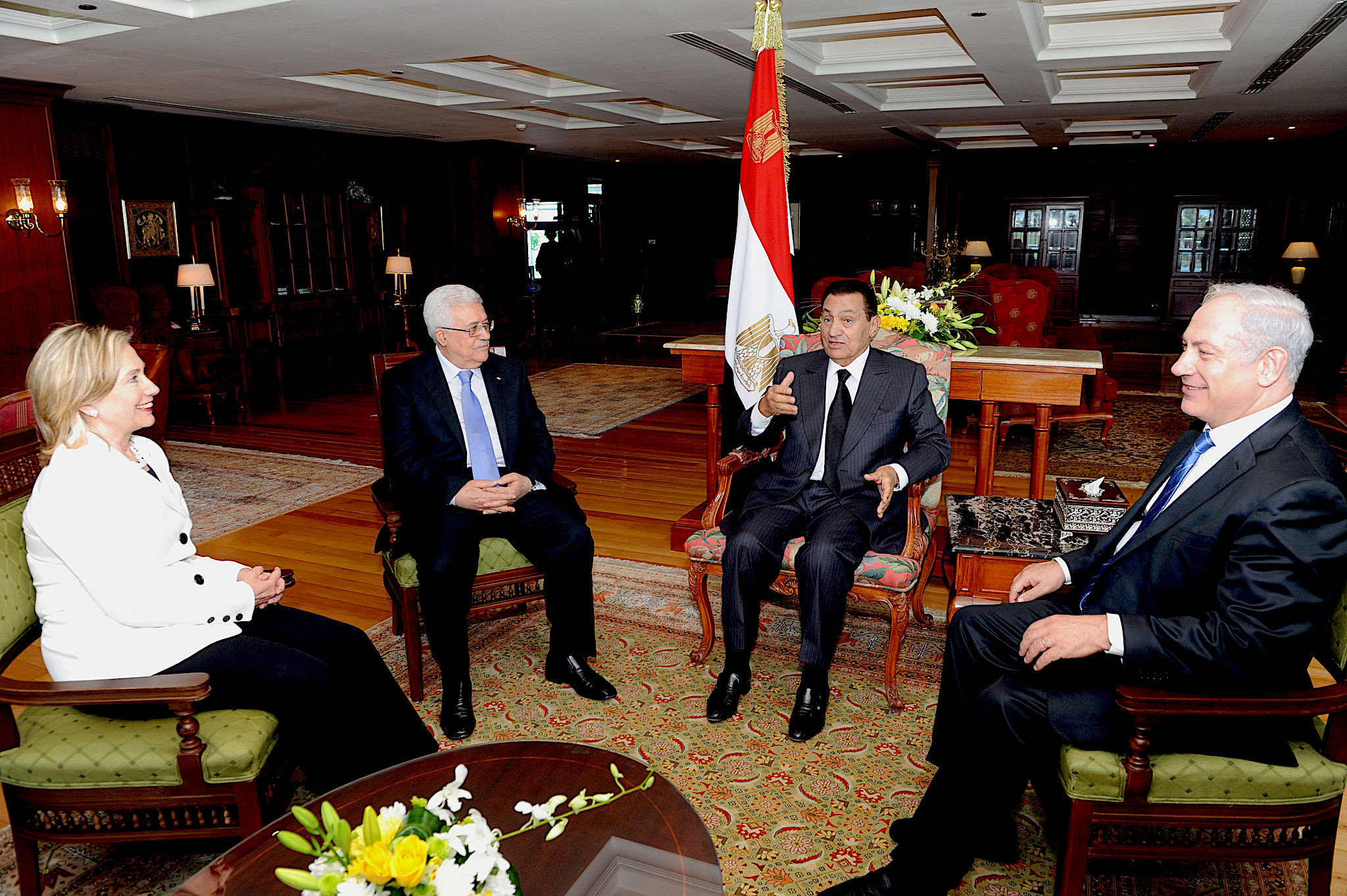In the second part of his review of Benjamin Netanyahu’s new book, Bibi: My Story, the author explores the Israeli prime ministers fraught relations with several world leaders, including U.S. presidents.

March 21, 2019: Israeli Prime Minister Benjamin Netanyahu on the phone with U.S. President Donald Trump during a visit by U.S. Secretary of State Michael Pompeo to Jerusalem. (U.S. State Department/Ron Przysucha)
This is the second part of the author’s book review of Bibi: My Story. First part here.
By As`ad AbuKhalil
Special to Consortium News
 Benjamin Netanyahu does not mind that his rude behavior and political chutzpah irked U.S. presidents.
Benjamin Netanyahu does not mind that his rude behavior and political chutzpah irked U.S. presidents.
He cites former U.S. President Bill Clinton demanding of him: “Who’s the f-ing leader of the free world?” (p. 227). But Netanyahu is assured that no American president would ever allow their annoyance with him to change U.S. policy because Congress would never end U.S. unconditional support for Israeli occupation and aggression.
Clinton’s secretary of state, Madeleine Albright, seems to be the most blunt and critical U.S. official in conversations with Netanyahu. There is no record of any U.S. leader speaking to him in the language of Albright. In public, however, Albright always avoided criticizing Israel and its leaders, no matter how many war crimes they committed.
In the book, Albright threatened Netanyahu and said: “You have two hours to give me an answer. If you don’t, I’ll go down to the press corps in the lobby and tell them who is responsible for blocking the peace” (p. 267).
In response, Netanyahu resorted to the typical, anti-Semitic blackmail card and threatened that he would accuse her of endangering the lives of Israel and Jewish people. Obviously, Albright did not follow through with her threat.
[Related: AS`AD AbuKHALIL: Netanyahu’s Anthology of Errors, Fabrications and Falsehoods]
In the last Camp David summit in the Clinton administration, Clinton invited Arafat and Ehud Barak and promised them both that he would not blame any of them for the failure of the talks. When the summit failed due to Israeli intransigence, Clinton rushed to the podium and blamed Arafat. In another incident, Albright is said to have scolded Netanyahu “as if I were a child,” telling him: “Now see what you’ve done. You’ve upset the president of the United States.”
Biden: ‘I’m Your Only Friend’

March 9, 2016: U.S. Vice President Joe Biden and Prime Minister Benjamin Netanyahu during a visit by the U.S. vice president and his wife to Israel. (U.S. Embassy Jerusalem/Flickr)
In private, former U.S. President Barack Obama was blunt with Netanyahu but not as scolding as Albright. Yet it didn’t amount to any shift in U.S. policy toward Israel and the Palestinians. Obama was as fiercely supportive of Israeli occupation and as hostile to Palestinian aspirations as previous presidents.
Netanyahu claims that Obama tried to intimidate him by reminding him that he came from Chicago (p. 371). Netanyahu says: “The prime minister of Israel was being treated as a minor thug in the neighborhood.” But then Vice-President Joe Biden assured Netanyahu that he could always count on him saying: “I’m the one friend you do have. So, call me when you need to.”
But later, even Biden protested at Netanyahu’s rudeness toward Obama, when he lectured him in the Oval Office before the press. Biden told him: “We’re a proud country. And no one, but no one, has the right to humiliate the president of the United States.” Had any other world leader addressed Obama in the hectoring tones of Netanyahu, he would have been kicked out of the U.S. and his country subjected to sanctions.
Netanyahu falsely claims that Obama “quickly issued demands for [Egyptian leader Hosni] Mubarak” to resign in 2011. It’s been known since the Shah’s days that Israel advocates for the U.S. to stand firmly by Arab despots no matter how unpopular, provided they aren’t opposed to Israel. In reality, the Obama administration supported Mubarak and even blamed the protesters for being violent.
After it became clear that the Egyptian people insisted on the downfall of Mubarak, then-Secretary of State Hillary Clinton clung to his brutal regime, suggesting that if Mubarak wasn’t acceptable, then the head of his secret police, Omar Suleiman, should be his successor. Netanyahu liked Mubarak and assures readers he is “far from the monstrous dictator depicted in the world press” (p. 405). When Arabs complain that Israel is the key protector of the Arab despotic order, the U.S. doesn’t believe them.

Sept. 14, 2010: Egyptian President Hosni Mubarak, second from right, with, from left, U.S. Secretary of State Hillary Clinton, Palestinian President Mahmoud Abbas and Israeli Prime Minister Benjamin Netanyahu in Sharm El-Sheikh, Egypt. (State Department/ Public domain)
Netanyahu next tells the story of the massive Egyptian protest at the Israeli embassy in Cairo on Sept. 9, 2011. Left on their own, the Arab people would not tolerate the presence of an Israeli embassy on their land. For that, a despotic regime is required to protect Israeli diplomatic property in Arab capitals.
But when Mubarak fell, Egyptian youth were free to make their feelings and demands known. They flocked to the Israeli embassy and tried to set it on fire.
Israel had its intelligence henchmen locked inside. Typically, Netanyahu relied on the U.S. government to protect his embassy from the wrath of the Arab public in Cairo. He claims that it was his threat to send a military force that prompted the Egyptian army to intervene and whisk the Mossad agents away from the embassy.
Netanyahu always wants to give credit to himself, first, and second to Israel. But it was the U.S. calls to the top Egyptian commander that prompted the Egyptian army to send in the special forces.
Netanyahu dishes on his relations with other Arab leaders. He claims in the book that Saddam Hussein sent him a message through the Russian foreign minister in 1998, in which the Iraqi leader made it clear that he had “no plans to attack Israel” (p 243). That is plausible as Saddam, like all Arab leaders, valued his hold on power more than any romantic notion of helping the Palestinian people return to their ancestral homeland.
Netanyahu made clear that he did not have good chemistry with King Hussein of Jordan (he says he enjoyed the chemistry with his brother, Prince Hasan). In one meeting in London, Queen Noor came downstairs and told Netanyahu and his wife: “You Israelis came to Palestine after the Holocaust and took the Palestinians’ land.” Netanyahu’s wife Sara retorted, according to her husband’s account: “It’s not their land. It’s been our land for over three thousand years” (p. 253).
The Palestinian ‘Problem’
In the book, Netanyahu admits there is such a thing as the Palestinian problem when he says, “The real cause of the ‘Palestinian problem’ was … the Palestinians themselves.” Such is the Israeli acknowledgement of the legitimate grievances of the Palestinian people. A statement like this should put to rest the notion that Israel would agree to any peaceful resolution with the Palestinians.
The nature of the collaborationist Palestinian regime that was established under the Oslo agreements is revealed in Netanyahu’s account of the relationship between himself and PLO leader Yasser Arafat. In one instance, Netanyahu calls Arafat and threatens him, saying that if he didn’t impose a cease-fire he would send in the tanks and “destroy [his] regime.” Arafat did as he was told. The Palestinian people were dealt a severe blow to their cause when Arafat agreed to the humiliating terms of Oslo.
For a leader who never stops bragging about his knowledge of Middle East politics and history, Netanyahu often reveals deep ignorance. At one point, he claims that there was a Palestinian leader named Abu Allah: the notion that a person is named Abu Allah is contrary to the basic tenets of Islam (he is referring to the Palestinian leader, Ahmad Quray`, whose nom de guerre was Abu `Ala’.)
Dealing with Putin & the UN
In dealing with Russian President Vladimir Putin, Netanyahu shows the extent to which the Russian leader catered to Israeli demands and stipulations. Putin, for example, made Russia delay the delivery of S-300s to Iran by seven long years (p. 392).
The U.N., as if we didn’t know, is exposed by Netanyahu for what is: an apparatus utilized by the U.S. and Israel to protect their interests and further their wars. When Israel attacked a Turkish ship off Gaza in 2010, killing nine protestors, Netanyahu rejected the call for a U.N. investigation. He reminded then Secretary General Ban Ki-moon of the U.N.’s Goldstone report that accused Israel of war crimes in Gaza, which angered Israel.
So Ban assured him: “I will personally choose the commission head and you will not be disappointed with my choice.” Sure enough, the Palmer report into the attack on the ship pleased Israel – and Netanyahu.
Netanyahu lastly provides insight into his insensitivity in pursuit of his political career. He relates the story of how he and his wife took two Israeli cancer-stricken children to attend the World Cup semifinals in Moscow (p. 245), not realizing — or caring — how the massive crowd and the travel could endanger the lives of the children with weakened immunities. Photo opportunities are clearly supreme for this U.S.-trained politician.
As`ad AbuKhalil is a Lebanese-American professor of political science at California State University, Stanislaus. He is the author of the Historical Dictionary of Lebanon (1998), Bin Laden, Islam and America’s New War on Terrorism (2002), The Battle for Saudi Arabia (2004) and ran the popular The Angry Arab blog. He tweets as @asadabukhalil
The views expressed are solely those of the author and may or may not reflect those of Consortium News.

“Queen Noor came downstairs and told Netanyahu and his wife: ‘You Israelis came to Palestine after the Holocaust and took the Palestinians’ land.’ Netanyahu’s wife Sara retorted, according to her husband’s account: ‘It’s not their land. It’s been our land for over three thousand years’.
Can’t believe that people believe such mind-bogglingly stupid argumentation.
3000 years ago – using this standard, what’s today Switzerland, Austria and Southern Germany, which were Celtic 3000 years ago, should these countries be handed over to settlement by the Scots, Irish and Welsh. There have been numerous, wide migrations of people over millenia. Can these just be reversed at will?
Not to mention the lack of any legal title…. Or the fact that the Palestinians – many of whom are Christian, some Jewish – and various local groups like the Samaritans, Assyrians etc are pretty clearly the descendants of the people who lived there 3000 years ago. ‘The extent to which this applies to returnees coming from afar, claiming that their ancestors in fact lived there 100 generations ago, is much more dubious.
Netanyahu arrogantly asserts that a legend from 20 centuries ago gives him the right to slaughter and rob an entire population of innocent people. This is just plain insanity. His capacity to censor the entire US corporate media is criminal.